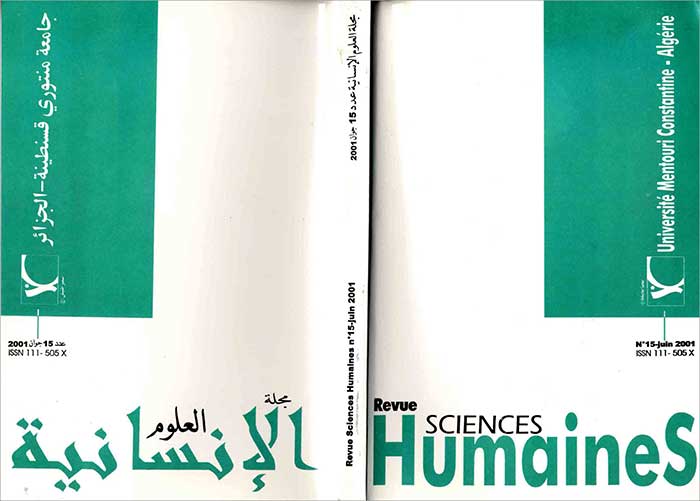Learning to think and learning to learn: From formalism to positive idiosyncrasy
الملخص
Si le langage, tel que considéré par les linguistes est contenu, formulation, notion et intention, suffit-il pour autant de dire que parler un langage est simplement articuler des mots, produire des sons et des sens?
Dans la société, les gens dans leur diversité, formulent, énoncent un langage et à chaque fois ce langage est différent et est nouveau.
Dans cet article, c’est cette même idée de nouveau, donc d’idiosyncrasie, que je veux inculquer et à faire apprendre à nos étudiants pour qu’ils soient attentifs dans leur apprentissage de la langue étrangère, et à développer, chemin faisant, leur propre langage (diction, style, etc…).
J’essaye donc de discuter les problèmes qu’ont justement nos étudiants à apprendre le langage cible, et je suggère des solutions d'un point de vue d’une politique de langue, laquelle s’affiche précisément dans la logique de la bipolarité : « apprendre à penser et apprendre à apprendre ».
Ces variations de langage sont dues principalement aux différentes situations. C’est précisément ces contextes de situations qu’on doit, nous enseignants, faire valoir et faire comprendre à nos étudiants pour qu’au lieu de répétitions mécaniques, ils apprennent à penser et apprennent à apprendre qu’à chaque contexte, qu’à chaque situation, il y a lieu d’adapter son langage et/ou le développer ou l’enrichir.
L’enseignant et sa science aidera l’étudiant à accomplir les deux tâches « d'apprendre à réfléchir et apprendre à apprendre ».
التنزيلات
المراجع
Ahulu, Samuel (1998), ‘Lexical variation in international English’, In English Today Vol. 14 N° 3 pp.29-34, C.U.P.
Anastasi, Anna (1982), Psychological Testing, McMillan Publishing Co., Ltd., New York.
Ba’alabaki, Munir (1979), ‘English words of Arabic origin’, In Al-Mawrid A Modern English-Arabic Dictionary, Dar El-Ilm Lil Malayen, PP. 01 – 16, Beirut, Lebabnon.
Chomsky, Noam (1975), Reflections on Language, Pantheon Books.
Fishman, J.A (1972), Sociolinguistics, J.P. Pride & Homes (eds), Penguin Books.
Gardner, Howard (1993), The Unschooled Mind, Fontana Press.
Garton, Alison ; & Pratt, C (1989), Learning to Be Literate The Development of Spoken and Written Language, Basil Blackwell.
Glebe, Eric (1991), ‘Dirty, disgusting and depraved’, In Speak Up, N° 54, Nov.91 pp. 36-37.
Grice, H.P (1975), ‘Logic and conversation’ in Cole and Morgan Syntax and Semantics Vol.3, Pp 41-58, London, New York. Academic Press.
Harris, Roy (1987), The Language Machine, Duckworth.
Hawkins, Eric (1984), Awarness of Language An Introduction, C.U.P.
Honey, John (1998), ‘The straw hippopotamus’ in English Today, Vol.14, N°3, pp.41-44, C.U.P.
Howe, Michel (1988),‘"Hot House" children’ in The Psychologist, Vol.1, N°9 pp., The Lavenham Press, Ltd.
Hutchinson, T; and A., English for Specific Purposes A Learning-Waters (1987), Centered Approach, C.U.P.
Hymes, Dell, H (1972), ‘On communicative competence’, In Sociolinguistics J.P. Pride and J.Holmes, pp. 269-293, Penguin Books.
James, K. (1988), ‘EAP---- ESP----self-sustaining growth’, In ELT Documents 129, pp.75-84, British Council.
Labed, Nacif (1997), Teaching Communication and the Effects of Longer Exposure to Language on 2nd Year Students’ Achievements in Listening and Speaking, Unpublished Magister Thesis, University of Constantine.
Lees, John, D., (1983), The Political System of the United States, Faber and Faber.
Maugham, Somerset (1978), Ten Novels and Their Authors, Pan Books Ltd.
Munby, John (1978), Communicative Syllabus Design, Cambridge : CUP.
Orbell, J., and R.M. Dawes, (1991), ‘"a cognitive miser" theory of cooperator’s advantage’ In American Political Science Review, Vol. 85, N° 2, pp 515-528.
Pool, Jonathan (1991), ‘The official language problem’, In American Political Science Review, Vol. 85 N° 2, pp 495-514.
Pride, J.P. (1971), The Social Meaning of Language, London: O.U.P
Saadi, Hacène (1996), ‘Piaget an research and studies of cognitive development : confirmations and contradictions’, In Expressions Vol. 5, N° 1, pp 67-76, University of Constantine.
Saadi, Hacène (1997), ‘The perception of two and three-dimensional pictures by pre-school Algerian children. A cognitive approach’, In Annales U.R.A.M.A., pp 89-94, University of Constantine.
Stubbs, Michael (1980), Language and Literacy, Routledge and Kegan Paul.
Swales, John (1990), Genre Analysis English in Academic and Research Settings, C.U.P.
Turner, G.W. (1973), Stylistics, Penguin Books.
















